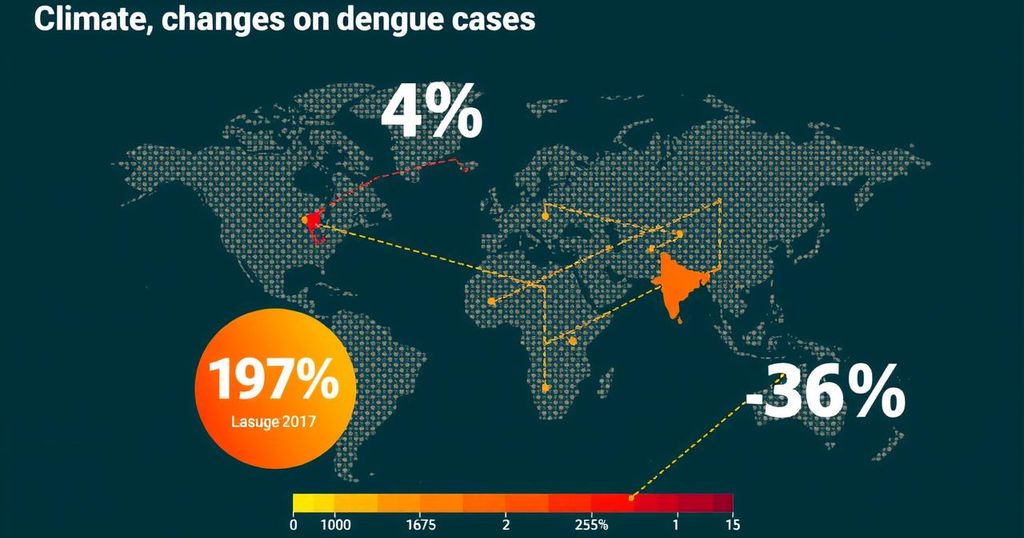Climate change is linked to nearly 20% of the global dengue cases reported this year, according to U.S. researchers. The rising temperatures are facilitating the spread of mosquito-borne diseases into new regions. A study outlines how the current increase in dengue cases correlates with climate warming, while also presenting Wolbachia-infected mosquitoes as a promising strategy to mitigate outbreaks. Over 12.7 million cases have been reported in 2023, and the actual figure may be closer to 100 million due to under-reporting.
Recent research indicates that climate change is responsible for nearly 20% of the unprecedented rise in global dengue cases this year. A team of U.S. researchers emphasizes the role of rising temperatures in spreading diseases and the need to establish the connection between climate change, health impacts, and environmental factors. Dengue, a disease transmitted by infected mosquitoes, has been historically localized to tropical regions, but increasing temperatures allow mosquitoes to migrate to new areas, bringing dengue along. The study, still under review, analyzed dengue infections across 21 countries, revealing that approximately 19% of current cases can be attributed to climate warming. Ideal conditions for dengue transmission exist within a temperature range of 20 to 29 degrees Celsius, prompting fears that regions in countries like Peru, Mexico, Bolivia, and Brazil could witness a dramatic increase in dengue cases—up to 200% in the next 25 years. This highlights the urgent need to address climate change as a contributing factor to public health crises. As of September, over 12.7 million dengue cases were documented globally in 2023, but researchers suspect the actual figure might be around 100 million due to substantial under-reporting. Presenting their findings at a conference in New Orleans, the researchers also discussed a potential solution involving the breeding of Wolbachia-infected mosquitoes, which reduce the transmission of dengue. In Brazil, the introduction of these mosquitoes in Niteroi during a severe dengue outbreak demonstrated significant success, leading to a 90% reduction in cases. This approach indicates promise in providing lasting protection against increasing dengue outbreaks, as collaboration with the Brazilian government aims to establish a facility for the mass production of these modified mosquitoes.
The relationship between climate change and health has gained increasing attention as researchers explore the direct links between environmental changes and public health issues. Dengue fever, a viral illness transmitted by mosquitoes, is particularly sensitive to temperature variations, making it a key focus for understanding the health impacts of climate change. As global temperatures rise, the habitats of dengue-carrying mosquitoes expand, leading to outbreaks in regions that were previously less affected. This growing body of research highlights the necessity of addressing climate change to mitigate its effects on vector-borne diseases and overall health.
The research conducted underscores the significant role of climate change as a driver of dengue outbreaks worldwide, attributing nearly a fifth of cases to climate-related factors. Furthermore, the examination of innovative strategies, such as the use of Wolbachia-infected mosquitoes, provides hope for combating the increasing threat of dengue. A comprehensive approach to tackling climate change and its implications for public health is essential to protect communities at risk and reduce the future incidence of mosquito-borne diseases.
Original Source: www.voanews.com







